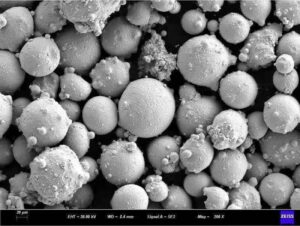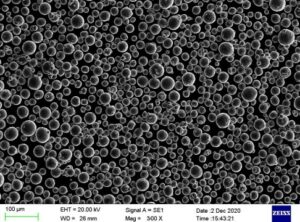Nickel (Ni) powders are becoming increasingly significant in various industrial applications due to their unique properties and versatility. From additive manufacturing and 3D printing to metal coatings and catalysis, Pure Ni Powder plays a vital role in many modern manufacturing processes. But what exactly is Pure Ni Powder, and why is it so essential? Let’s dive deep into the world of nickel powders to uncover their uses, composition, characteristics, and benefits.
This article will explore every facet of Pure Ni Powder, providing insights into its types, applications, characteristics, and technical specifications. Whether you’re a materials scientist, manufacturer, or hobbyist, you’ll find valuable information here that demystifies this powerful material.

Overview of Pure Ni Powder
Pure Ni Powder, or pure nickel powder, is a metallic powder produced by various methods such as atomization, electrolysis, or chemical precipitation. It is highly prized for its excellent corrosion resistance, high-temperature stability, electrical conductivity, and strength. These properties make it indispensable in fields ranging from aerospace to electronics.
Nickel is a transition metal and part of the iron group, with notable magnetic and conductive properties. Pure nickel powder, especially in its ultrafine form, offers high surface area and activity, which is essential in catalysis and energy storage applications. Nickel powders are available in various forms depending on the particle size, shape, purity, and specific application requirements.
Key Highlights of Pure Ni Powder:
- Corrosion Resistance: Nickel naturally resists oxidation and corrosion, making it ideal for coatings.
- Magnetic Properties: Nickel is one of only four ferromagnetic elements, meaning it can be magnetized.
- High-Temperature Tolerance: Nickel maintains its properties even at elevated temperatures.
- Electrical and Thermal Conductivity: It offers moderate levels of both electrical and thermal conductivity.
Types of Pure Ni Powder
Nickel powders can vary significantly in terms of composition, particle size, shape, and purity. Below are some specific models of pure nickel powder that are commonly used in industrial applications:
| Nickel Powder Model | Description | Particle Size | Applications |
|---|---|---|---|
| Ni-101 | Ultra-fine, spherical powder | 0.5-1 micron | Electronics, additive manufacturing |
| Ni-201 | High-purity powder with low oxygen content | 2-5 microns | 3D printing, conductive coatings |
| Ni-300 | Standard-grade nickel powder | 5-10 microns | Catalysts, battery electrodes |
| Ni-400 | Pre-alloyed powder with iron | 1-3 microns | Aerospace components, wear-resistant coatings |
| Ni-500 | Electrolytic nickel powder | 10-15 microns | Plating, metal injection molding |
| Ni-600 | Flake-shaped nickel powder | 3-7 microns | EMI shielding, fuel cells |
| Ni-700 | Nickel-carbonyl powder | Sub-micron | High-end electronics, advanced ceramics |
| Ni-800 | High-density powder | 15-20 microns | Powder metallurgy, hardfacing alloys |
| Ni-900 | Nano-nickel powder | 50-100 nm | Supercapacitors, nanomaterials research |
| Ni-1000 | Custom alloyed nickel powder | Varies | Specialized applications in additive manufacturing |
Table Caption: Types and Specifications of Pure Ni Powders
These models represent a small portion of the variety of nickel powders available, each tailored to specific use cases. Depending on your application, selecting the right type of Ni powder is critical to achieving the desired performance.
Composition of Pure Ni Powder
Understanding the composition of Pure Ni Powder is essential for determining its suitability in different industries. While the core component is nickel, the presence of trace elements or alloying materials can alter its properties significantly. The following table highlights the typical composition of various grades of nickel powders.
| Nickel Grade | Ni Content (%) | Oxygen Content (%) | Carbon Content (%) | Iron (%) |
|---|---|---|---|---|
| Ni-101 | 99.9% | 0.05% | 0.02% | <0.01% |
| Ni-201 | 99.8% | 0.02% | 0.01% | <0.005% |
| Ni-300 | 99.5% | 0.1% | 0.03% | 0.05% |
| Ni-500 | 99.7% | 0.03% | 0.02% | <0.02% |
| Ni-600 | 98.5% | 0.5% | 0.1% | 0.1% |
| Ni-700 | 99.99% | 0.005% | 0.002% | <0.001% |
| Ni-800 | 99.0% | 0.4% | 0.05% | 0.05% |
Table Caption: Composition of Pure Ni Powders (By Grade)
Higher-purity nickel powders (like Ni-700 and Ni-101) are often used in high-end electronics and sensitive applications where contaminants must be minimized. Lower purity powders, while still highly functional, may contain trace elements like iron or carbon, which could affect the performance in specific applications.
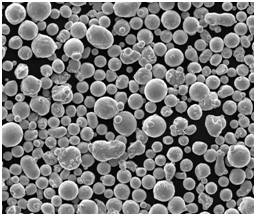
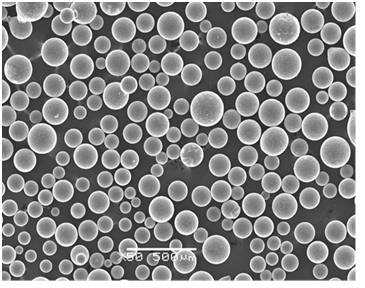
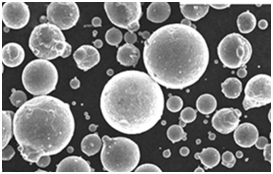


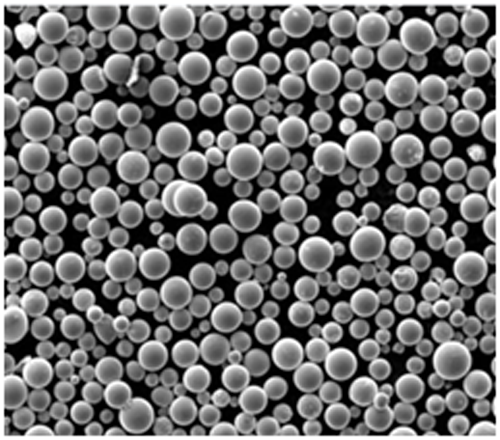
Characteristics of Pure Ni Powder
When it comes to choosing materials, knowing the characteristics of pure nickel powder is essential. Here’s a closer look at some of the core characteristics that set Pure Ni Powder apart from other metal powders.
1. Corrosion Resistance
Nickel is naturally resistant to corrosion, which is one of its most valuable traits. This makes it highly desirable in harsh environments where metals are prone to rusting, such as marine, chemical, and industrial applications. Compared to other materials, nickel’s corrosion resistance is superior, making it a go-to for protective coatings.
2. Magnetic Properties
Nickel is one of the few metals that are ferromagnetic. This allows it to be magnetized, making it perfect for use in electromagnetic applications like motors, transformers, and inductors. When compared to iron, nickel’s magnetic properties are slightly weaker but more stable over time.
3. High-Temperature Stability
Nickel maintains its strength and integrity even at elevated temperatures. Its ability to withstand temperatures exceeding 1400°C makes it ideal for high-temperature industrial applications like gas turbines and aerospace components. Compared to other metals such as copper or aluminum, nickel exhibits far better thermal resistance.
4. Electrical Conductivity
While nickel is not the best conductor of electricity compared to materials like copper or silver, its moderate conductivity combined with other properties like corrosion resistance makes it highly suitable for electrical applications where longevity and durability are key concerns.
5. Surface Area and Reactivity
Ultrafine nickel powders, particularly those in the nanometer range, offer high surface area-to-volume ratios. This increased surface area enhances reactivity, making nickel an excellent choice for catalytic processes, fuel cells, and other energy applications. In comparison to bulk nickel, nano-nickel powders offer significantly greater performance in catalytic applications.
6. Mechanical Strength
Nickel is known for its toughness and durability, providing substantial mechanical strength. In powder form, nickel can be sintered into strong components for use in various manufacturing processes, including powder metallurgy and metal injection molding.
Applications of Pure Ni Powder
Pure Ni Powder is used across many industries due to its multifaceted properties. Below is a table showcasing the different applications and industries where nickel powders are crucial.
| Industry | Application | Why Nickel Powder? |
|---|---|---|
| Aerospace | Jet engine components, turbine blades | High-temperature stability and corrosion resistance |
| Electronics | Conductive pastes, batteries, magnetic materials | Electrical conductivity, magnetic properties |
| Automotive | Catalytic converters, fuel cells | Catalysis and reactivity |
| Chemical Industry | Hydrogenation catalysts, synthetic gas production | High surface area and reactivity |
| 3D Printing | Additive manufacturing of metal parts | Customizability, strength, and durability |
| Coating and Plating | Protective metal coatings for corrosion resistance | Anti-corrosion properties |
| Medical Devices | Implants, surgical tools | Biocompatibility and corrosion resistance |
| Energy Storage | Battery electrodes, supercapacitors | Electrical conductivity and surface area |
| Metal Injection Molding | Precision components | Mechanical strength and durability |
| Marine | Propellers, pumps, valves | Corrosion resistance in seawater environments |
Table Caption: Common Applications of Pure Ni Powders
Specifications and Standards for Pure Ni Powder
When selecting Pure Ni Powder for your application, understanding the specifications and standards is critical. The following table details key specifications such as particle size, purity, and applicable standards.
| Specification | Range | Applicable Standards |
|---|---|---|
| Particle Size | 0.5 micron – 50 microns | ASTM B330, ISO 4497 |
| Purity | 98.5% – 99.99% | ASTM B330 |
| Density | 8.9 g/cm³ | ASTM B212 |
| Flowability | 25 – 30 seconds/50g | ASTM B213 |
| Apparent Density | 3.5 – 4.5 g/cm³ | ASTM B417 |
Table Caption: Specifications and Standards for Pure Ni Powder
By adhering to these standards, manufacturers ensure consistent quality, performance, and safety for various industrial and scientific applications.
Suppliers and Pricing of Pure Ni Powder
Sourcing pure nickel powder from reliable suppliers is crucial for maintaining high product quality. The following table provides an overview of some key suppliers and their price ranges.
| Supplier | Region | Product | Price Range ($/kg) |
|---|---|---|---|
| Vale | Global | Electrolytic Nickel Powder | $35 – $50/kg |
| American Elements | USA | High-Purity Nickel Powder | $45 – $70/kg |
| Sigma-Aldrich | USA/Global | Nano-Nickel Powder | $300 – $500/kg |
| Tekna | Canada | Spherical Nickel Powder | $50 – $80/kg |
| Advanced Metal Powders | China | Nickel Alloy Powders | $40 – $65/kg |
| Nanoshel | India/Global | Nano Nickel Powder | $250 – $400/kg |
Table Caption: Suppliers and Pricing of Pure Ni Powder
Prices for nickel powders can vary significantly based on purity, particle size, and geographical location. For high-end applications, such as in nanomaterials or medical devices, the cost may be substantially higher.
Advantages and Limitations of Pure Ni Powder
Pure Ni Powder offers a range of advantages, but like any material, it also has its limitations. Understanding these can help you make informed decisions about when and how to use nickel powders in your projects.
Advantages of Pure Ni Powder:
- Corrosion Resistance: Nickel’s ability to resist oxidation makes it perfect for harsh environments.
- Magnetic Properties: Its ferromagnetic nature allows use in a variety of electromagnetic applications.
- High-Temperature Performance: Nickel’s stability at high temperatures extends its usefulness in aerospace and other industries requiring heat resistance.
- Moderate Conductivity: While not as conductive as copper, nickel offers a good balance of conductivity and durability, especially in corrosive environments.
- Versatility: Pure nickel powder can be used in a wide range of applications, from energy storage to additive manufacturing.
Limitations of Pure Ni Powder:
- Cost: High-purity nickel powders, especially those in nano form, can be expensive.
- Lower Conductivity: Nickel is less conductive compared to other metals like copper, which may limit its use in some electrical applications.
- Limited Availability of High Purity Grades: Ultra-pure nickel powders (99.99%) can be difficult to source and may require custom orders.
- Reactivity in Fine Forms: Ultrafine nickel powders can be highly reactive, which can pose safety risks during handling and storage.
Table Caption: Advantages and Limitations of Pure Ni Powder
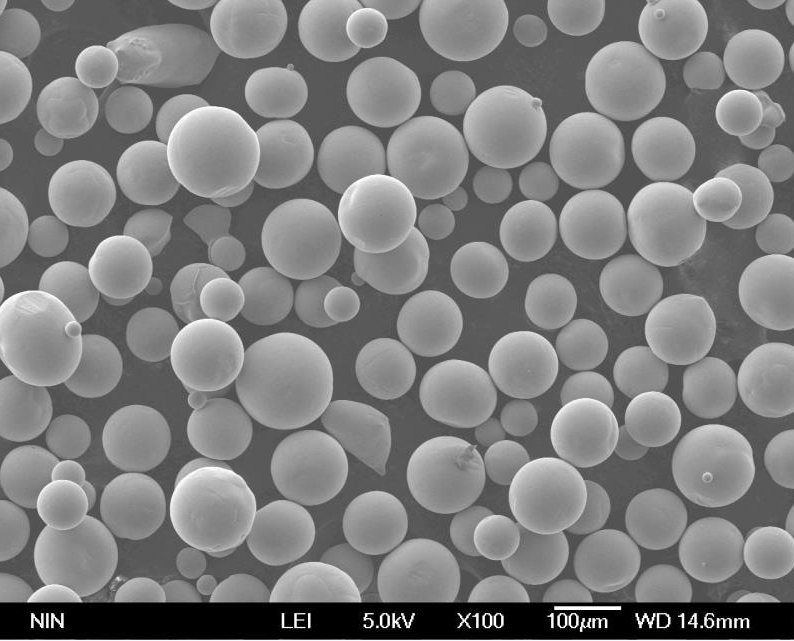
FAQ
| Question | Answer |
|---|---|
| What is Pure Ni Powder used for? | Pure Ni Powder is used in various applications, including 3D printing, battery electrodes, catalysts, and protective coatings. |
| How is Pure Ni Powder made? | It can be produced through methods like atomization, chemical precipitation, or electrolytic refining. |
| What is the price of Pure Ni Powder? | Prices range from $35 to over $500 per kilogram, depending on purity, particle size, and form. |
| What industries commonly use Pure Ni Powder? | Aerospace, automotive, electronics, and chemical industries are the primary users. |
| What are the magnetic properties of Pure Ni Powder? | Nickel is ferromagnetic and can be magnetized, making it useful in electronic and electromagnetic applications. |
| How does the purity of nickel powder affect its performance? | Higher purity nickel powders offer better corrosion resistance and conductivity, while lower purity grades are more economical but may have limited uses. |
Table Caption: Common Questions and Answers about Pure Ni Powder
In conclusion, Pure Ni Powder is a versatile material that offers a broad range of applications due to its unique combination of properties. Whether you’re working on a cutting-edge additive manufacturing project or developing new catalysts for the chemical industry, nickel powder can provide the performance and reliability you need.
By understanding its characteristics, choosing the right grade, and considering factors like cost and supplier reliability, you can make the most of this powerful material in your work.
